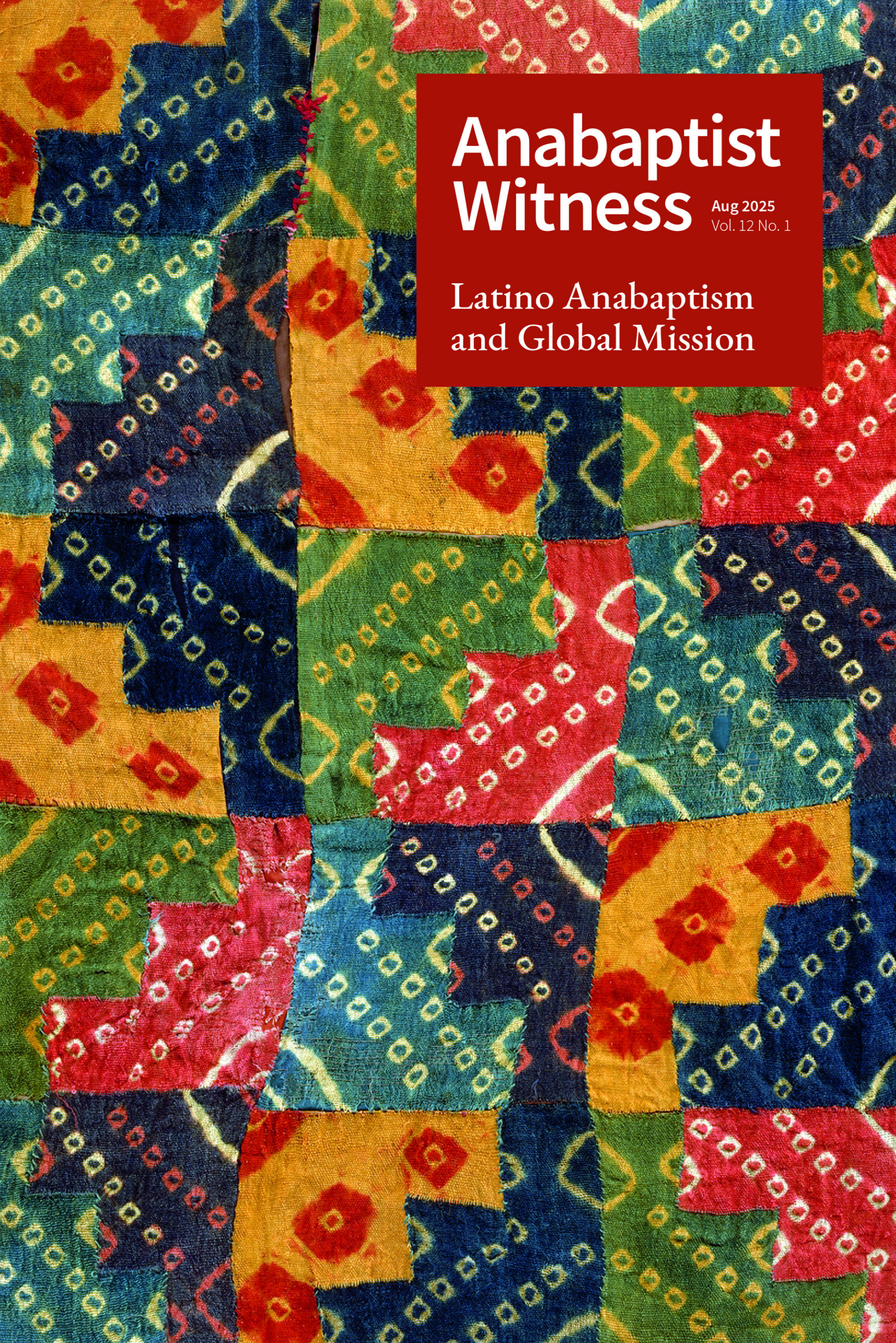Mission and Protest
About This Issue Download this issue
Mission and Protest
The Anabaptist relation to government is often described in terms of separation, withdrawal, and rejection. Anabaptist commitment to discipleship community relativizes all other allegiances, perhaps especially those to nation or country, which are invariably ordered by means “outside the perfection of Christ”—to quote the influential Schleitheim “Brotherly Union” of 1527.1 From this perspective, mission is the Anabaptist alternative to government. It is a nonviolent invitation to join a peaceable community regulated only by love, where the church displays the alternative politics of Jesus rather than attempting to influence, much less run, coercive power.
Historically, however, Anabaptists have related to governing authorities in a wide variety of ways. The roots of Anabaptism are in the failed German peasant revolutions, and many early Anabaptists would have seen continuity between their faith and the peasant aims, which included land redistribution and the abolition of serfdom. Anabaptist pastors Balthasar Hubmaier and Bernhard Rothmann even initiated reforms alongside civic rulers. As persecution grew, many Anabaptists advocated for religious toleration. Later, Anabaptists from Northern Europe reached agreements with authorities in the Netherlands, Prussia, and Russia ensuring their toleration and relative isolation. Russian Mennonites have now negotiated “privileges” with governments throughout the Americas and have reached high government office in Canada and Paraguay. Today, Anabaptists in countries such as Tanzania serve in government and military roles.
That said, since the sixteenth century there have been few cases of sustained, widespread Anabaptist resistance to government. The descendants of the “radical Protestants” largely ceased to protest, perhaps in response to the trauma of persecution. The early twentieth century saw North American Anabaptists get involved in refugee resettlement—which required significant cooperation with governments—and make a successful bid to be recognized as conscientious objectors to military service during the Second World War.2 This experience generated theological activity aimed at legitimating service and political advocacy as part of Christian witness. The new theology, in turn, supported the work of organizations such as Mennonite Central Committee and its advocacy centers in Ottawa and Washington, DC.3
Yet protest was still regarded by many Anabaptists as suspicious, as essentially a form of coercive resistance. For example, many white Mennonites were troubled in 1962 when African American Mennonite Central Committee worker Vincent Harding was arrested on a protest march in Albany, Georgia; it was one thing for Harding and his wife, Rosemarie Freeney Harding, to organize an interracial “Menno House” that displayed the possibility of reconciliation in a racially divided society, and quite another thing to openly challenge state authority.4
Harding’s message to Anabaptists, expressed most publicly at the 1967 Mennonite World Conference general assembly in Amsterdam, was to join Jesus by joining protest marches:
March out saints, and be counted. March out of the buildings. March out of the denominations, march out of the churches, if need be. March out of the conformity and out of the terror of the roaring night. You have nothing to lose but your lives, and a world to gain. March out saints. Leap up and march out! The Master is already on the road, and He says, “I am the way; follow me.”5
Harding, in other words, insisted that Anabaptist commitments to nonconformity and discipleship could only be realized by participation in protest movements, which were then spreading around the world.
Although Harding continues to be venerated by some Anabaptists,6 few have taken up his call. Those who have done so have joined protests against autocracy in the Soviet Union, racism in the United States, indigenous genocide in Canada, violence in Colombia, and apartheid in South Africa. But, unlike in the 1950s and 60s, when Anabaptists developed a theology of service and advocacy as Christian witness, there has been little written to connect protest to an Anabaptist theology of the church’s mission.7This issue of Anabaptist Witness contributes to filling that gap.
In the opening essay, Andrew Suderman defines protest movements as political challenges to unjust regimes; these regimes rely on violent policing to contain and crush protest and so maintain their grip on society. For Suderman, as for Harding, Christian discipleship entails joining Jesus’s defiance of domination, and so preparing to face—and protest—police power.
A poem by Carol Tobin situates protest at the overflow of Jesus’s joyful challenge to the forces of evil. Playfully echoing the words of John 1, Tobin shows that Jesus’s “coming over” “over came” evil, as is visible in his “wild” action at the temple.
Lydia Wylie-Kellerman’s poetic essay on growing up, and now raising her own children, at protest marches, speaks to the ordinary practices necessary to sustain justice movements across generations. Without diminishing the risks of protest, Wylie-Kellerman shows how protest requires attention to packed lunches, tired feet, and school schedules. Inviting children into the “wide rivers of nonviolence” involves honoring and trusting them while persistently including them in the struggle.
One recent site of major protest activity is Colombia. César Moya draws on decolonial theory to analyze these protests as a form of resistance to “coloniality.” After describing the context of the protests, Moya argues that Christians committed to peacebuilding need to see anticolonial protest as part of their work of creating an “imperfect peace.” Specifically, protests are one way that Christians side with victims of injustice; it is from this position that Christian peacebuilders attempt to build bridges between victims and perpetrators.
Part of the struggle, as Moya defines it, is to remember past injustices rightly, as an act of resistance to oppressive forces that seek to obliterate memories and so avoid responsibility. Luke Martin recalls his own participation alongside a group of Mennonite missionaries in Vietnam during the United States’ brutal war against the Viet Cong. As those missionaries came to know Vietnamese people and learn their history and experience of the war, and as they reflected in this light on their convictions as disciples of Jesus, they began to speak out against the war, issuing a “Letter from Vietnam to American Christians” in 1967. This “Letter,” which we are glad to reprint here, called Christians in the United States to remember the legacy of French colonialism and American exploitation, and to grapple with the damage done by the war to Vietnamese lives as well as to Christian witness.
A poem by Harold Recinos reflects on four years of struggle during the presidency of Donald Trump, invoking the “cross” and “prayers” of those who protested during that period. Recinos hopes for a “new day,” in which the fruit of those protests would contribute to the ongoing transformation of the United States into a livable political community.
David Driedger’s essay on recent publications on Christianity and socialism begins a review section that further illuminates this issue’s theme. Anabaptists have developed rich missional theologies of alternative community, service, and nonviolent advocacy in recent decades. Hopefully this issue will help foster a similar development in our theology of protest as witness.
Jamie Pitts, editor
1 . The Schleitheim Confession, translated and edited by John Howard Yoder (Scottdale, PA: Herald, 1977), 14.
2. For recent historical overview, Andrew P. Klager, From Suffering to Solidarity: The Historical Seeds of Mennonite Interreligious, Interethnic, and International Peacebuilding (Eugene, OR: Pickwick, 2015), especially chapters 1 through 5.
3. On the Washington Office, see Graber Miller, Wise as Serpents, Innocent as Doves: American Mennonites Engage Washington (Knoxville, TN: University of Tennessee Press, 1996).
4. Tobin Miller Shearer. “A Prophet Pushed Out: Vincent Harding and the Mennonites,” Mennonite Life 69 (2015), accessed October 5, 2021, https://mla.bethelks.edu/ml-archive/2015/a-prophet-pushed-out-vincent-harding-and-the-menno.php.
5. Harding, “The Beggars Are Marching . . . Where Are the Saints?,” in The Witness of the Holy Spirit: Proceedings of the Eighth Mennonite World Conference, Amsterdam, the Netherlands, July 23–30, 1967, edited by Cornelius J. Dyck (Elkhart, IN: Mennonite World Conference, 1967), 128–29.
6. I was touched to learn from Alle Hoekema that some Dutch Mennonites, in memory of Harding and his 1967 Mennonite World Conference message, continue to tithe a portion of their income annually to social justice causes.
7 Drew G. I. Hart’s work is an important exception here, as indicated by the title of his recent book, Who Will Be a Witness? Igniting Activism for God’s Justice, Love, and Deliverance (Harrisonburg, VA: Herald, 2020). Other notable Anabaptist theological writings have developed a related theology activism, such as J. Denny Weaver, The Nonviolent Atonement, 2nd ed. (Grand Rapids, MI: Eerdmans, 2011), where Jesus is portrayed as an activist. Recent Anabaptist writings on peacebuilding also typically include a role for “strategic nonviolence,” as in Lisa Schirch, The Little Book of Strategic Peacebuilding: A Vision and Framework for Peace with Justice (Intercourse, PA: Good, 2004), chapter 7.





